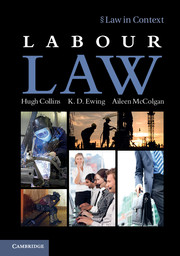Book contents
- Frontmatter
- Contents
- Preface
- Acknowledgments
- Table of cases
- Table of statutes
- Table of statutory instruments
- Table of European Union instruments
- Table of ILO instruments
- Table of other international instruments
- Abbreviations
- Part I Introduction
- Part II The contract of employment
- Part III Statutory regulation of the employment relationship
- Part IV Collective labour rights
- 12 Freedom of association and the right to organise
- 13 Freedom of association and trade union autonomy
- 14 The right to bargain collectively
- 15 The right to be informed and consulted
- 16 Collective action and the right to strike
- 17 Liability for collective action
- Part V Termination of employment
- Index
- References
17 - Liability for collective action
from Part IV - Collective labour rights
- Frontmatter
- Contents
- Preface
- Acknowledgments
- Table of cases
- Table of statutes
- Table of statutory instruments
- Table of European Union instruments
- Table of ILO instruments
- Table of other international instruments
- Abbreviations
- Part I Introduction
- Part II The contract of employment
- Part III Statutory regulation of the employment relationship
- Part IV Collective labour rights
- 12 Freedom of association and the right to organise
- 13 Freedom of association and trade union autonomy
- 14 The right to bargain collectively
- 15 The right to be informed and consulted
- 16 Collective action and the right to strike
- 17 Liability for collective action
- Part V Termination of employment
- Index
- References
Summary
Introduction
There is probably a manual in a law firm somewhere that provides guidance to employers who want to break a union. The early pages of the manual will be devoted to tactics to be used to keep the union out. But there will also be pages of the manual that deal with the situation where a union has become established. Some of these pages will guide the employer on how to break a strike. The aim of the employer will usually be to keep production or the delivery of services going during the strike, and to minimise its impact in various ways. In the first instance, the employer may be advised to prevent or stop the action by seeking a remedy in the courts to restrain the union by way of injunction on the ground that the tortious conduct of the union is actionable. Alternatively – or if this fails – the employer may seek to enlist third-party support to maintain production or the delivery of services. In the British Airways cabin crew dispute of 2009–11, this involved contracting with other airlines to provide aircraft and crew to carry BA passengers, and to encourage other employees to train for cabin crew duties so that BA could continue to operate at least some of its own fleet. On other occasions, employers have recruited new staff or recruited temporary staff, sometimes from an employment agency, though as we shall see this is a practice that is now unlawful.
- Type
- Chapter
- Information
- Labour Law , pp. 706 - 758Publisher: Cambridge University PressPrint publication year: 2012



